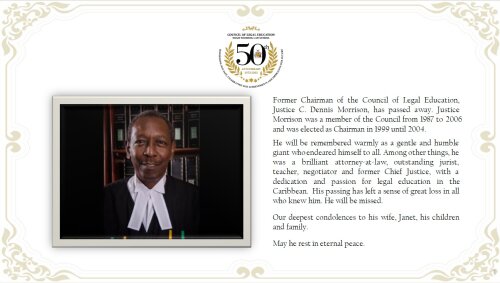Best Collaborative Law Lawyers in Port of Spain
Share your needs with us, get contacted by law firms.
Free. Takes 2 min.
Free Guide to Hiring a Family Lawyer
List of the best lawyers in Port of Spain, Trinidad and Tobago
About Collaborative Law in Port of Spain, Trinidad and Tobago
Collaborative Law, also referred to as Collaborative Practice, is an alternative dispute resolution technique where parties and their legal representation, mutually agree to work together to resolve disputes without the need for litigation. In Port of Spain, Trinidad and Tobago, collaborative law is often used in divorce proceedings, business disputes, and other civil matters. It is widely regarded for its emphasis on cooperation, transparency, and diligent commitment to a resolution that is beneficial for both parties involved.
Why You May Need a Lawyer
In situations involving divorce, child custody disputes, or complex business dealings, the need for a collaborative lawyer becomes critical. These lawyers guide the negotiation, taking into account the emotional, financial, and legal implications. Skilled collaborative lawyers can help you navigate the process in a peaceful and respectful way, offering often necessary expertise in avoiding the adversarial, public, and drawn-out proceedings that litigation can often involve.
Local Laws Overview
Trinidad and Tobago operates under a mixed jurisdiction of civil law and common law. The local laws pertaining to collaborative law primarily revolve around family law, labor law and commercial disputes. It is important to note that all involved parties in the collaborative law process must sign a 'participation agreement' stipulating they will withdraw from the process if a party decides to proceed to court. This commitment is structured to motivate all parties involved to collaboratively resolve the issue at hand.
Frequently Asked Questions
What is the advantage of using Collaborative Law?
Collaborative Law allows both parties to discuss and negotiate directly in a structured and respectful setting. It can save time and resources, preserves relationships, and keeps the process entirely confidential.
What happens if agreement is not reached through Collaborative Law?
If an agreement isn't reached through the collaborative process, the parties may choose to go to court. However, the lawyers involved in the collaborative process will typically withdraw from the case, as established in the participation agreement.
Can any lawyer practice Collaborative Law?
While any lawyer can theoretically engage in collaborative negotiations, lawyers specifically trained in collaborative law generally have more detailed knowledge, skills, and perspective necessary for this unique process.
Is Collaborative Law quicker than litigation?
While every case is unique, collaborative law can often be a quicker resolution method than traditional courtroom litigation, as it removes court schedules and delays from the equation.
Is Collaborative Law costly?
Compared to litigation, Collaborative Law can be significantly less expensive. It avoids the costs associated with a trial, including court fees and related expenses.
Additional Resources
For more support and information, you could reach out to "The Dispute Resolution Centre" at the Faculty of Law, UWI St. Augustine Campus, which offers various mediation and conflict resolution services. Additionally, the Law Association of Trinidad and Tobago may also provide valuable guidance and resources on collaborative lawyers.
Next Steps
If you believe that Collaborative Law is the most effective route for your situation, your next step should be to consult with a lawyer who has specific training in collaborative practice. They can review your case, provide guidance about the process, and help you understand your options. Be sure to bring all relevant documentation to your consultation so as to facilitate a more effective discussion.
Lawzana helps you find the best lawyers and law firms in Port of Spain through a curated and pre-screened list of qualified legal professionals. Our platform offers rankings and detailed profiles of attorneys and law firms, allowing you to compare based on practice areas, including Collaborative Law, experience, and client feedback.
Each profile includes a description of the firm's areas of practice, client reviews, team members and partners, year of establishment, spoken languages, office locations, contact information, social media presence, and any published articles or resources. Most firms on our platform speak English and are experienced in both local and international legal matters.
Get a quote from top-rated law firms in Port of Spain, Trinidad and Tobago — quickly, securely, and without unnecessary hassle.
Disclaimer:
The information provided on this page is for general informational purposes only and does not constitute legal advice. While we strive to ensure the accuracy and relevance of the content, legal information may change over time, and interpretations of the law can vary. You should always consult with a qualified legal professional for advice specific to your situation.
We disclaim all liability for actions taken or not taken based on the content of this page. If you believe any information is incorrect or outdated, please contact us, and we will review and update it where appropriate.














